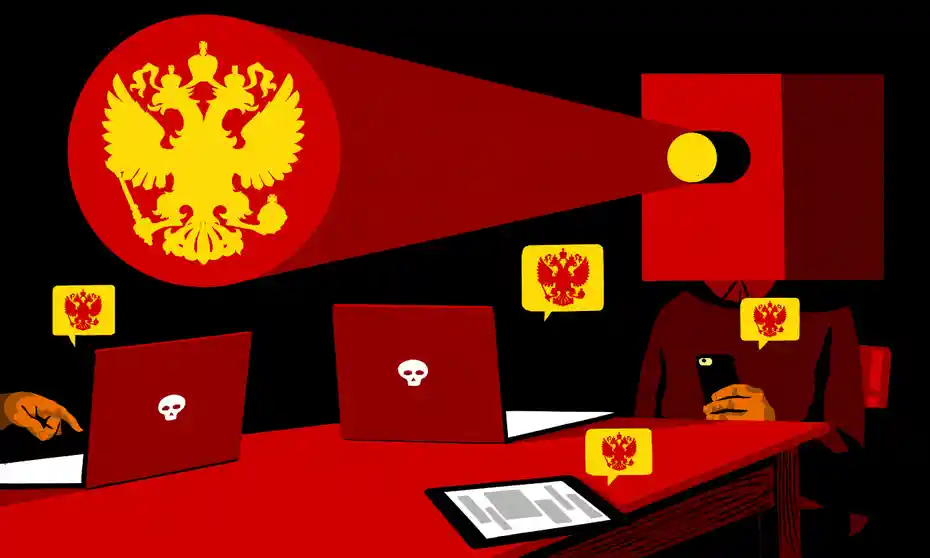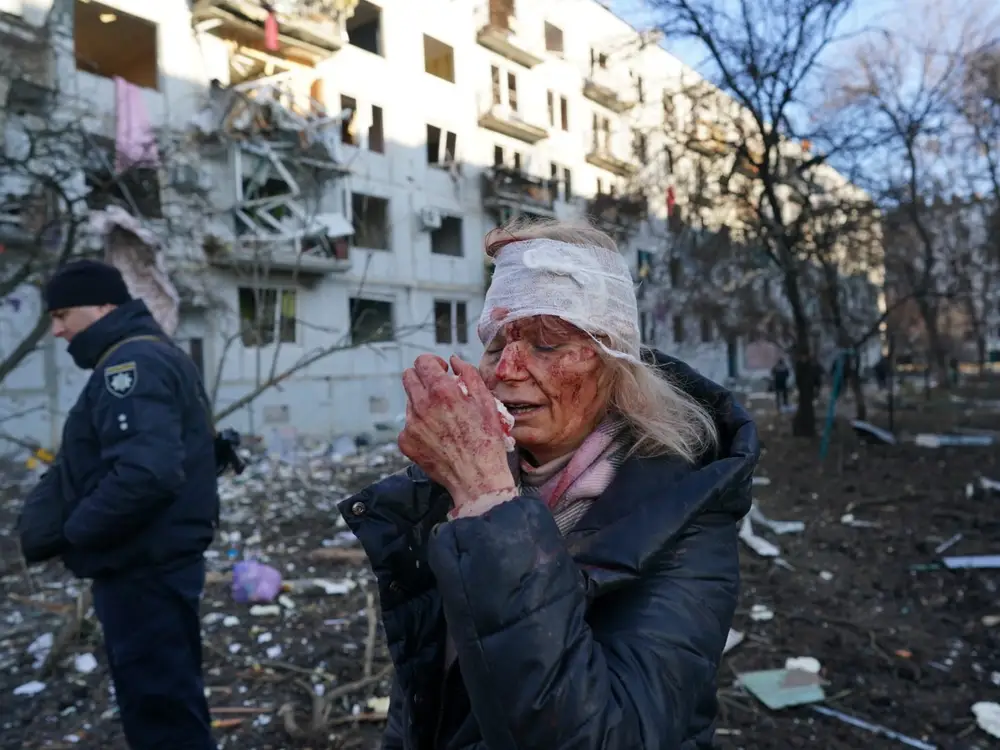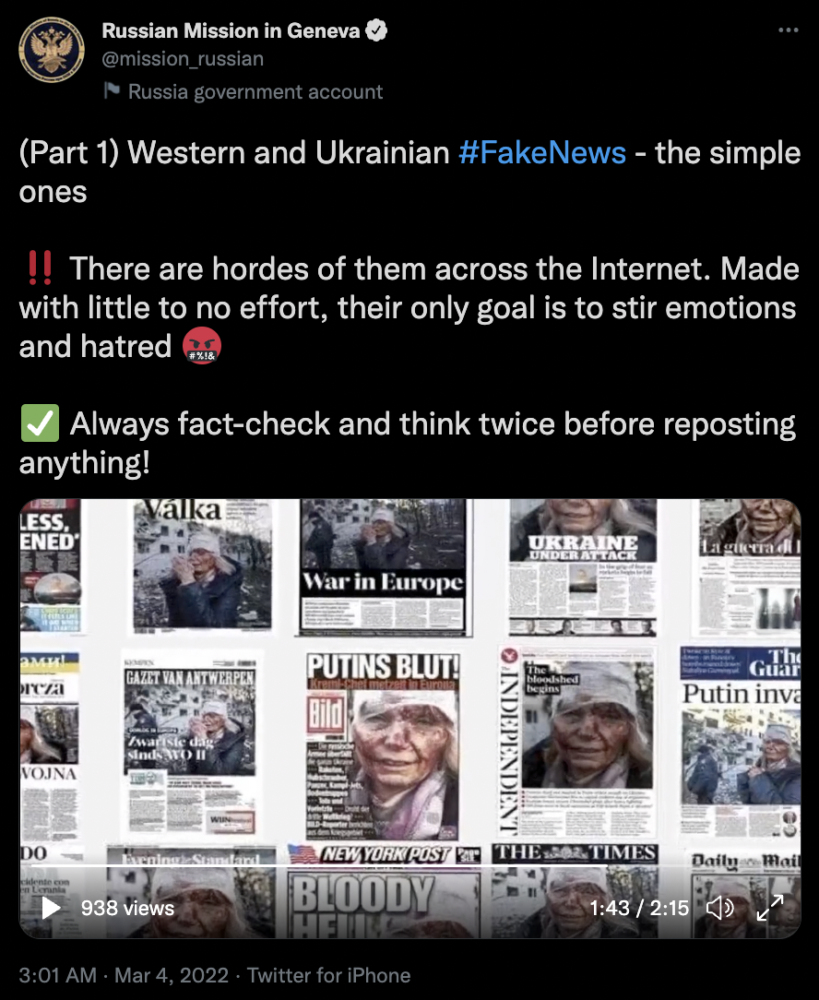
Eden Milligan | Editor-in-Chief
March 6, 2022
Considering the circumstances, support for Russia’s invasion of Ukraine should be low. While Russian troops continue to die at unconfirmed rates (estimated at 1,500 to over 4,000, claimed to be 498 by Russia) and Ukrainians suffer, a state-run poll shows that Russian trust in Putin has risen to 71% since the invasion. Shockingly, a majority of Russians in January did not think war with Ukraine was probable, and the Russian public—like the rest of the world—still does not know exactly what Russia’s goals are.
How can a government increase support for a war that it refuses to be transparent about? Propaganda, of course. It’s been deployed successfully by warring countries—including the United States—for centuries, but Russia seems to have mastered the art of public manipulation. In Russia, news outlets have fostered a negative view of the West and NATO for years, and they have been effective. Currently, 50% of Russians believe the U.S. and NATO are to blame for the war. Still, given the information available via the Internet and the clear victimization of Ukraine evidenced by Ukraine’s president calling for peace throughout the Russian offensive, it is incredulous that only 4% of Russians blame their own government for the war.
“Everything that’s not propaganda is being eliminated,” Dmitri Muratov, a Nobel Prize-winning Russian editor and journalist said. Independent radio and television stations were suddenly liquidated at the start of the war. Muratov shared that his own newspaper, Noyava Gazeta, known for its critical insight and investigation into Russian affairs, fears being forced to shut down soon.
In Russian media and schools, the word “war” in relation to the conflict is not allowed. Instead, teachers and broadcasters call the conflict a “special military operation.” Russia’s internet censor board Roskomnadzor (yes, Russia has a federal agency whose role is to control media) has threatened to block any Russian website that calls the Ukraine situation an “invasion,” “attack,” or “declaration of war.” The media must also “use only information and data from official Russian sources.” That means the public will see all of their news sources tell that, as of March 3, 498 Russian soldiers have died. Even if a thousand body bags return to Moscow, the media must not disobey official reports or outlets will forfeit their right to report altogether.
Disobeying the Roskomnadzor would also come with a fine of 5 million rubles, or nearly $50,000 (although the value of the ruble has fallen rapidly in the past weeks). Additionally, parents have been warned to monitor their children’s use of social media, including specific platforms like TikTok, where they may be told apparently untrue anti-war propaganda or be pressured to go to “unsafe” war protests.
The propaganda extends beyond limiting critical views of Russia—some “news” is entirely fabricated. “I watched a video that was supposedly posted by a Russian student where they were learning about this conflict. The video basically villainies Ukrainians, calling them neo-Nazis and drug addicts,” senior Alexia Goettems shared. “They made it seem like Ukrainians were fighting amongst themselves and Russia was there to save them.” Though Goettems acknowledged that Russia cannot hide the truth in an interconnected world, she contended that “their propaganda will create enough confusion and distrust that many Russians won’t know what is actually happening and will ultimately side with their homeland.”
The most prominent news agencies in Russia are, unsurprisingly, owned by the government. It is speculated that these news sources are publicizing false reports of Ukrainian troops repeatedly surrendering. Also, Putin’s false narratives—such as Ukrainian forces using civilians as human shields—are perpetuated without evidence by news articles. Putin’s claim that a central goal of Russia in the “operation” is to “denazify Ukraine” and protect the Ukrainian people from, as Putin said, the “humiliation and genocide perpetrated by the Kyiv regime,” has also been firmly supported by the media. The number one news source in Russia, TASS, reported that Russia was not striking cities and was instead aiming to destroy military infrastructure. Any google search of the Ukrainian cities of Kyiv, Kharkiv, and Kherson definitively proves otherwise.

Through a steady flow of false news in Russia and frequent warnings to avoid the propaganda of Western nations, Russia’s efforts to distort the truth have been mostly successful. Still, these efforts are deeply flawed since Russia, unlike China, does not have a firewall that prevents citizens from easily accessing Western media. Resultantly, Russia has been careful to expose “fake news” across social media.
As a result of the influx of Russian propaganda across media platforms, Google (parent company of YouTube) and Meta Platforms Inc. (parent company of Facebook and Instagram) have announced actions against Russian propaganda. YouTube will be removing ads from Russian news on the app, demonetizing the news sources. YouTube is a major source of news for Russians and a platform for the popular news channel RT (Russia Today). Already, RT has announced that they have shut off the RT America sector of the network, seemingly due to funding issues. Facebook and Instagram are now fact-checking and labeling news from Russian state-owned media organizations.

This poses the question: is it truly the responsibility of media corporations to be the defenders of truth?
“I strongly believe that the truth carries more weight than any lie can counterfeit, and media companies are in no position to regulate media from Russia—or anything else, for that matter,” senior Owen Geer said. “Under no circumstance should media companies be responsible for the regulation of truth and untruth. That is for people to decide on their own,” he added.
Certainly, these regulatory actions seem unsettling when considering the power these platforms have to control public knowledge. While defunding or regulating pro-war propaganda may be easily justifiable, this could set a precedent of interference by media corporations in international disputes.
These corporations are not the only non-state actors battling Russian propaganda. The EU has banned state-owned Russian media companies from operating in Europe. It seems that a sort of media warfare is occurring between Western countries, Western media corporations, and Russia. Ultimately, with no way to stop news pouring into Russia from around the world, the Russian government will have to act carefully to maintain its image.

Leave a Reply